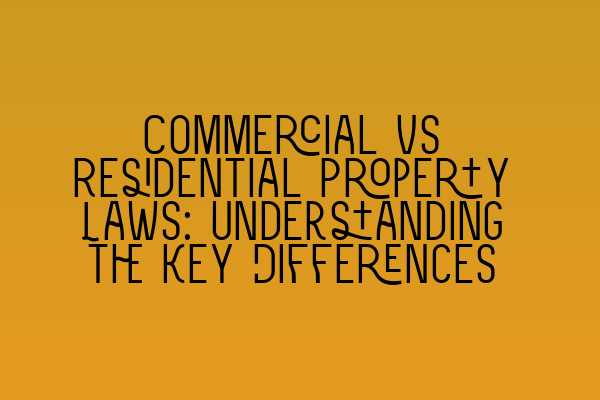Commercial vs Residential Property Laws: Understanding the Key Differences
In the world of property law, commercial and residential properties are governed by different sets of regulations and laws. Understanding the key differences between these two types of properties is essential for property owners, investors, and those involved in legal matters related to property.
Commercial Property Laws
Commercial property refers to real estate that is used for business or income-generating purposes. It includes office buildings, retail spaces, industrial properties, warehouses, and more. Commercial property laws aim to regulate the rights and obligations of the parties involved in commercial property transactions. These laws cover a wide range of aspects, including leasing, zoning, contracts, financing, and disputes.
One key aspect of commercial property law is commercial leases. Unlike residential leases, commercial leases are typically longer and more complex. They involve detailed provisions related to rent, length of lease, maintenance responsibilities, use of the property, and more. It is crucial for both landlords and tenants to understand the terms and conditions of the lease before entering into an agreement.
Zoning regulations also play a significant role in commercial property law. Zoning laws dictate how a property can be used within a specific area. They ensure that commercial properties are in compliance with the designated zoning category. For example, certain areas may be zoned for retail use only, while others may be designated for industrial or mixed-use purposes. Understanding and adhering to the zoning regulations is crucial for property owners to avoid potential legal issues and penalties.
Another critical aspect of commercial property law is financing and contracts. Commercial property transactions often involve large sums of money and complex financial arrangements. Real estate contracts for commercial properties must be carefully drafted to protect the interests of all parties involved. Legal experts, such as solicitors specializing in property law, help facilitate these transactions by ensuring that contracts are legally binding and all necessary legal requirements are met.
Property disputes are common in the commercial real estate sector. These disputes may arise from issues such as breach of contract, non-payment of rent, property damage, or disagreements over lease terms. Having a strong understanding of commercial property laws is crucial when resolving these disputes, whether through negotiation, mediation, or litigation.
Residential Property Laws
Residential property refers to real estate that is used for personal living purposes, such as houses, apartments, condominiums, and townhouses. Residential property laws focus on protecting the rights of tenants, landlords, and homeowners. These laws cover areas such as leases, tenancy agreements, eviction processes, tenant rights, and maintenance obligations.
Residential leases differ significantly from commercial leases. Residential leases are generally standardized and follow specific regulations to ensure fairness and protection for both tenants and landlords. There are laws that govern security deposits, rent increases, lease termination, habitability standards, and tenant rights to privacy.
Eviction processes are another important aspect of residential property laws. When tenants fail to pay rent, engage in illegal activities, or violate the terms of the lease, landlords must follow a legal process to evict them. Residential property laws specify the steps that landlords must take to evict tenants, including serving proper notices and obtaining court orders if necessary.
Maintenance obligations and responsibilities are also outlined in residential property laws. Landlords are generally responsible for maintaining the property’s habitability and ensuring that it meets health and safety standards. Tenants, on the other hand, have obligations to keep the property clean and report any maintenance issues promptly.
Understanding the key differences between commercial and residential property laws is crucial for property owners, investors, and legal professionals. While both types of properties involve property rights, leases, and contracts, the specific regulations and rules significantly differ.
As an investor or property owner, it is essential to seek legal advice from solicitors specializing in property law to ensure compliance with applicable laws and regulations. These legal experts can help draft contracts, guide clients through commercial or residential property transactions, and resolve disputes effectively.
For more information on property law, contract law, and related topics, we invite you to read our other informative articles:
– SQE Contract Law: Analyzing Landmark Cases and Influential Judicial Decisions
– Understanding Contractual Capacity: Rights and Limitations
– Interactive SQE Mock Tests for Contract Law: Test Your Knowledge
– Join Our SQE Contract Law Webinars: Expert Insights and Guidance
– SQE Prep: Mastering the Essentials of Contract Law
At SQE Property Law & Land Law, our team of expert solicitors specializes in property law and is here to assist you with your commercial and residential property needs. Contact us today for professional advice and guidance.
